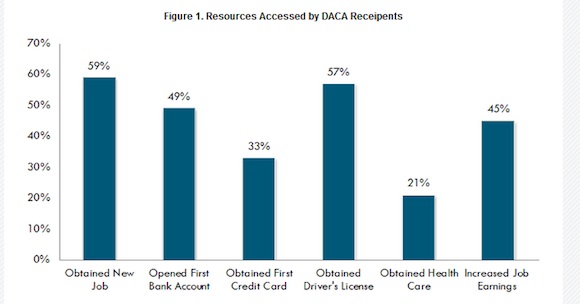The Benefits of DACA
DACA, or Deferred Action for Childhood Arrivals, is a program that was introduced in 2012 by the Obama administration to provide temporary relief from deportation to certain undocumented immigrants who arrived in the United States as children. This program has been a topic of much debate and discussion, and it is important to understand the benefits it offers to individuals who qualify.
Legal Protection and Work Authorization
One of the key benefits of DACA is that it provides recipients with legal protection from deportation. Under this program, eligible individuals are granted a period of deferred action, which means that they are considered lawfully present in the United States. This protection allows them to live and work in the country without the constant fear of being deported.
Additionally, DACA recipients are eligible for work authorization. This means that they can obtain a Social Security number and apply for employment legally. With work authorization, they can pursue better job opportunities, earn a stable income, and contribute to the economy.
Access to Education
DACA also opens doors to education for eligible individuals. Many states allow DACA recipients to pay in-state tuition rates at colleges and universities, making higher education more affordable and accessible. This enables them to pursue their academic goals and expand their knowledge and skills.
Moreover, DACA recipients may also be eligible for various scholarships and financial aid programs, further reducing the financial burden of obtaining a college degree. By increasing access to education, DACA empowers individuals to achieve their full potential and contribute to society in meaningful ways.
Healthcare Benefits
Another advantage of DACA is that it provides recipients with access to healthcare. While DACA itself does not grant healthcare coverage, it allows eligible individuals to obtain health insurance through their employers or state programs. This ensures that DACA recipients can receive necessary medical care and treatment, promoting their overall well-being.
Social Integration and Community Contributions
DACA plays a crucial role in fostering social integration and community contributions. Providing legal status and work authorization, allows recipients to fully participate in their communities. DACA recipients can openly contribute to society, volunteer, and engage in civic activities, making positive impacts in their neighborhoods, schools, and workplaces.
Furthermore, DACA recipients often serve as role models and inspiration for other undocumented individuals. Their success stories highlight the potential and talent that exists within the immigrant community, challenging stereotypes and promoting inclusivity.
Economic Benefits
From an economic standpoint, DACA has been shown to bring significant benefits. According to studies, DACA recipients have been able to secure higher-paying jobs and increase their earning potential. This leads to increased tax revenue for the government and stimulates economic growth.
Moreover, DACA recipients often invest in their education and professional development, which further contributes to the economy. By creating a pathway for these individuals to fully participate in the workforce, DACA strengthens the labor market and boosts productivity.

In conclusion, DACA provides numerous benefits to eligible individuals. It offers legal protection, work authorization, access to education, and healthcare benefits, and promotes social integration and community contributions. Additionally, DACA has positive economic impacts by increasing tax revenue and enhancing productivity. Understanding and appreciating the benefits of DACA is crucial for creating a more inclusive and prosperous society.
Frequently Asked Questions about the Benefits of DACA
Q1: What is DACA?
A1: DACA stands for Deferred Action for Childhood Arrivals. It is a program that provides temporary protection from deportation and work authorization to eligible undocumented immigrants who were brought to the United States as children.
Q2: Who is eligible for DACA?
A2: To be eligible for DACA, individuals must have arrived in the United States before their 16th birthday, have continuously resided in the country since June 15, 2007, and meet other specific criteria outlined by the U.S. Citizenship and Immigration Services (USCIS).
Q3: What are the benefits of DACA?
A3: The benefits of DACA include protection from deportation, the ability to obtain work authorization, access to certain federal benefits, and the opportunity to obtain a Social Security number and driver’s license in some states.
Q4: Can DACA recipients attend college?
A4: Yes, DACA recipients can attend college in the United States. Many states also offer in-state tuition rates for DACA students.
Q5: Can DACA recipients get a driver’s license?
A5: Yes, in some states, DACA recipients are eligible to obtain a driver’s license. However, the availability of driver’s licenses for DACA recipients varies by state.
Q6: Can DACA recipients travel outside the United States?
A6: DACA recipients can apply for permission to travel outside the United States through a process called Advance Parole. However, it is important to consult with an immigration attorney before making any travel plans.
Q7: Can DACA recipients apply for financial aid for college?
A7: DACA recipients are not eligible for federal financial aid, but some states and colleges offer their financial aid programs or scholarships for undocumented students.
Q8: Can DACA recipients get health insurance?
A8: DACA recipients are not eligible for most federally funded health insurance programs, such as Medicaid or Medicare. However, they may be eligible for private health insurance plans or state-funded programs in certain states.
Q9: Can DACA recipients apply for permanent residency or citizenship?
A9: DACA does not provide a direct path to permanent residency or citizenship. However, DACA recipients may be eligible for other forms of relief or pathways to legal status, depending on individual circumstances.
Q10: Is DACA permanent?
A10: DACA is not a permanent solution. It provides temporary protection from deportation and work authorization, subject to renewal every two years. The program’s future is subject to change based on government policies and legal challenges.




